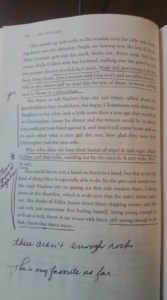“Skim Reading” is a term from this article. Here is an excerpt:
Increasing reports from educators and from researchers in psychology and the humanities bear this out. English literature scholar and teacher Mark Edmundson describes how many college students actively avoid the classic literature of the 19th and 20th centuries because they no longer have the patience to read longer, denser, more difficult texts. We should be less concerned with students’ “cognitive impatience,” however, than by what may underlie it: the potential inability of large numbers of students to read with a level of critical analysis sufficient to comprehend the complexity of thought and argument found in more demanding texts, whether in literature and science in college, or in wills, contracts and the deliberately confusing public referendum questions citizens encounter in the voting booth.
I just had a discussion about everyone’s face in their phone two days ago with girlfriends. And then comes this – saying we are skimming reading.
Newsflash: I have *always* skim read. I had my own books I wanted to read and then school assignments. Later it was newspapers (I am surprised at least Boomers, usually the ones pointing fingers, don’t remember all the cartoons about men with their faces stuck in the newspaper at the breakfast table), 3 of them, keeping up with local news for organizing. Then the internet. I tend to consume mass quantities of non-fiction by reading the top line of paragraphs to get the gist of an article. When I read fiction, and it’s a good book, I read fast because I want to see what happens. This is the norm for me. Always has been.
Until.
Recently I took a book class at Writer’s Village University, my favorite place to take writing classes. I was keeping myself occupied to balance worrying about hubby’s health issues. I was amazed at what I got from a close reading and from sharing that with others.

I have been a member of reading clubs but never found them quite like this because *we had to write essays* for the class, which changed everything. I was floored by reading what others wrote that I completely missed and had some really good insights myself by reading sections and then writing an essay on what I took from that section. I find this works best if I read all the way through and then come back and section it out. Reading “Olive Kittridge” to learn linked stories, 2 stories at a time, had the same effect (because I bought it early to get ahead and then read the whole thing in 3 days).
I don’t know that this will change the way I read everything, because I read *a lot* – that means 4 – 7 books going at any one time, and others (mostly poetry, especially prose poetry these days) that I have to browse when I’m not in the mood to read novel length work.
All of this may be different for younger people. But as I say above, I have read this way since I learned to read. I used to lean over my desk in 2nd grade and read a page or two out of my latest “Black Stallion” or “Island Stallion” book before sitting back upright. In Catholic school, with a nun at the front of the (60 student) class, you learned to do this FAST to not get in trouble.
If we want to point at anything, let’s also point at the collage/montage presentation of MTV starting in the 90s that *everyone* emulates now. That’s harder to digest. Reading, if it’s intriguing, you can always go back and reread.
As for me, a girlfriend and I are getting ready to work through a non-fiction book together so that we can be sure we get what we want from it. We will do this on-line via emails. We wouldn’t even know each other were it not for my blog.
I’m so sure that the priests were wringing their hands when the common folks learned to read and could pick up the bible and muddle through it on their own. When I was in grade school, we were cautioned not to read it on our own as it needed mediation. That is more about power than reading. But I am sure it was presented as fact that it was really bad for you without a priest’s intervention, as in you might misread and wind up in hell! Don’t take the chance!
And so we come to skim reading.
I for one don’t believe it is harming us. I think young folks coming up will work out their own way of ingesting what is important to them just as I have. It may not look like what I do, but it will have the same effect. We, as a species, most of us (with one large exception that comes immediately to mind, but that’s a different post), are curious. Some of us learn by reading, some by listening, some by hands on. This hasn’t changed. Instead of worrying about readers, perhaps we should also look to the other modalities of learning and make sure our schools (and let’s hope we still have public schools in 5 years) address ALL of those modalities, as well as helping students find their best ways of learning and support that.




1 Comment
Never was a skim reader until the internet when I have too many things to read.
So I guess I can understand how kids these days who have grown up with the internet could start out as skimmers. But when I am reading a book, whether it’s an ebook or paper, I am still not a skimmer. And even reading every word does not guarantee I will remember what I read months or years from now. 😉